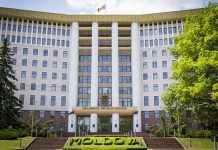Russian President Dmitry Medvedev’s March 18 meeting with Moldovan President Vladimir Voronin and Transnistria leader Igor Smirnov (see EDM, March 20) was designed to mark a qualitatively new stage in the long-running negotiations on the Transnistria conflict. While continuing to block the conflict resolution negotiations, Russia is trying to move the process toward a formula to guarantee Russian control of this part of Moldova, with troops in place. Moldova’s general elections, which are scheduled for April 5, give the Kremlin leverage to pressure Voronin into accepting Russia’s terms.
The tripartite Moscow declaration abruptly proposes a "peace-guaranteeing" military operation for the post-conflict period, despite the deadlock in the negotiations on a political solution to the conflict. At the same time the declaration omits any mention of conflict resolution principles. It abandons Russia’s earlier lip service to Moldova’s territorial integrity and it treats Chisinau and Tiraspol as co-equal parties.
Also for the first time at this level and with this explicitness, Russia shows its intention to retain its troops in Moldova to "guarantee the peace" in the post-conflict period. According to the Moscow declaration, those troops would act under an OSCE flag and, presumably, would include token non-Russian elements.
The OSCE Greek Chairmanship’s special representative, Haralambos Christopoulos, promptly welcomed the Moscow declaration and, specifically, the proposal on troops: "Should there be a request to turn the existing peacekeeping force into an OSCE peace-guaranteeing operation, the OSCE Chairmanship stands ready to take such a request to [OSCE’s] Permanent Council" (OSCE press release, March 19).
Thus, Russia is moving for the first time at an international level to discuss post-conflict guarantees by Russian troops, even as Russia itself freezes the conflict resolution negotiations on Transnistria. Furthermore, the possibility of an official request for such an operation is now being aired for the first time. Apparently, Moldova would be expected to submit such a request.
Unsurprisingly, Russia suggests awarding the OSCE with the flag for such an operation. Exploiting this organization’s structural weaknesses, Russia has demonstrated that it can paralyze certain OSCE field presences, including that in Moldova in previous years. Russia forced the termination of the OSCE’s Border Monitoring Operation in Georgia (2004) and micromanaged the OSCE’s presence in Georgia’s region of South Ossetia, ultimately terminating it (2008) with full impunity. Russia would undoubtedly play cat-and-mouse again with the OSCE in Moldova, if the OSCE leaps at Russia’s offer. Some in the OSCE may indeed find it tempting for the organization to play a security actor’s role, with authority to confer peacekeeping mandates. In that case Russia would undoubtedly prevail in negotiating the mandate and parameters of a "peace-guaranteeing" operation in Moldova.
While the tripartite declaration envisages post-conflict "guarantees," Tiraspol proposes a system of "guarantees" pending a political resolution of the conflict. In Medvedev’s presence and undoubtedly with his approval, Smirnov handed over to Voronin a draft agreement on such guarantees. Smirnov had arrived in Moscow several days earlier than Voronin for that meeting and evidently cleared Tiraspol’s document with Russian authorities.
This document defines Russia and Ukraine as international "guarantors" and the OSCE as a party to the system of guarantees. Within that context and while retaining the "existing" peacekeeping operation (i.e., Russia’s troops), "the sides" Moldova and Transnistria would provide "reciprocal guarantees" to each other to implement past and future agreements. Violations by either side would trigger consultations by "guarantors" Russia and Ukraine together with the aggrieved side and possible corrective actions by those "guarantors" (president.pmr-gov.org, Interfax, March 19).
Stung, Moldovan authorities have not reported Tiraspol’s proposal publicly even after the mass media in Moscow and Tiraspol did so. Chisinau has for years ruled out the idea of guarantees of the types envisaged in the tripartite Moscow declaration and Tiraspol’s accompanying proposal. Moldova will be loath to introduce the proposed "guarantees" on the negotiating agenda. Tiraspol and Moscow will, however, almost certainly demand that the issue of "guarantees" be included on that agenda as a condition to restarting the international 5+2 negotiations. The "guarantees’" meaning is that the sides [Chisinau and Tiraspol] authorize the guarantors to ensure implementation of agreements signed or to be signed. "Only in this case would negotiations make sense," Smirnov warned while in Moscow (Interfax, March 18).
Russia seems keen to suddenly unblock the negotiations, using the mechanism that Moscow and Tiraspol had created one year ago in anticipation of such an eventuality. This would involve working out socio-economic "confidence-building measures" by Chisinau’s and Tiraspol’s expert groups; holding one or several Voronin-Smirnov meetings and some diplomatic "consultations" in the 2+1 format (Chisinau, Tiraspol, Russia); adopting political-settlement proposals on Russian terms in that format, and finally submitting those proposals to a reconvened 5+2 format (Chisinau, Tiraspol, Russia, Ukraine, OSCE, the United States, and the European Union), so as to present the Western participants with a fait accompli.
Pursuant to decisions made at the March 18 Moscow meeting, Voronin is to meet with Smirnov on March 25 in Tiraspol for a review of the expert groups’ confidence-building activity (Moldpres, March 19). In the next step, according to Russia’s special envoy Valery Nesterushkin, the 5+2 negotiations are to resume on April 8 (Interfax, March 23). The March 25 date falls only 11 days before Moldova’s parliamentary elections and the April 8 date falls a few days ahead of the installation of Moldova’s new parliament, which will confirm a new government and elect a new head of state. Russia is exploiting Moldova’s electoral context to squeeze maximum concessions on Transnistria.






